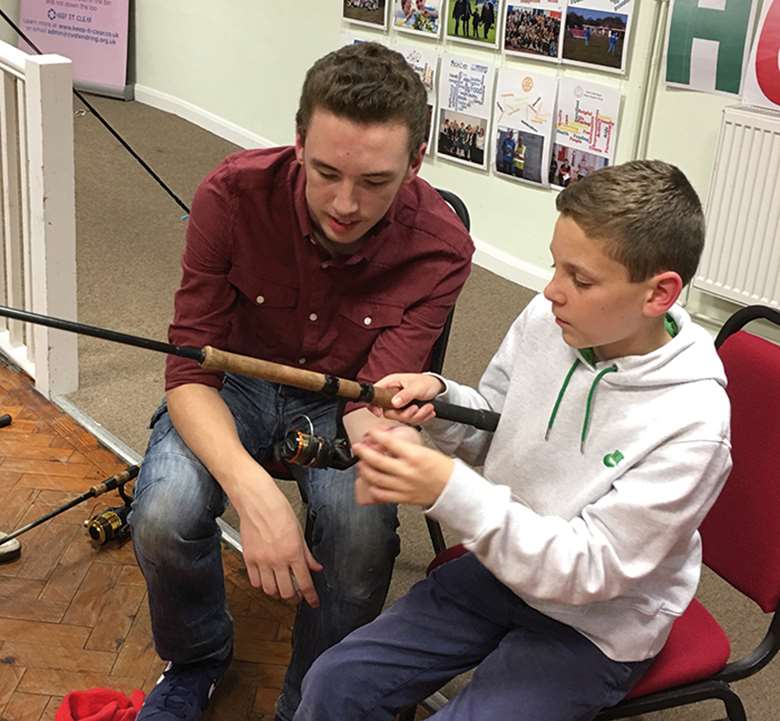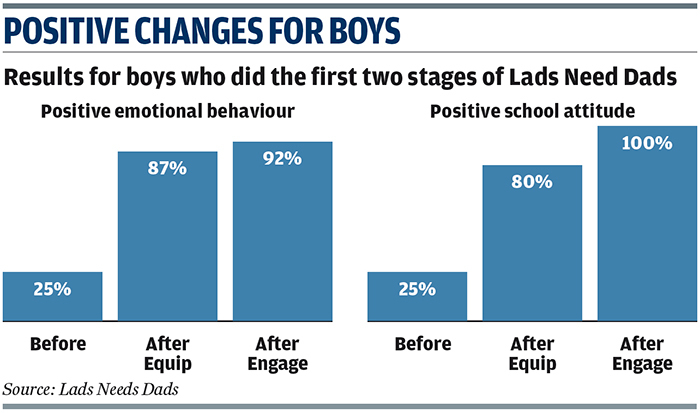Early help gives boys male role model
Emily Rogers
Tuesday, August 29, 2017
Early intervention programme gives fatherless boys support to become more motivated, responsible, capable and emotionally resilient.

PROJECT
Lads Need Dads
PURPOSE
To empower 11- to 15-year-old boys with absent fathers or limited access to a male role model to become more motivated, responsible, capable and emotionally resilient
FUNDING
£4,000 from the School for Social Entrepreneurs, £21,000 from the Essex Police and Crime Commissioner, and £10,000 from the Shackleton Foundation
BACKGROUND
Lads Need Dads was founded in Essex in June 2015 by Sonia Shaljean, who had spent 20 years supporting families, offenders and vulnerable people through drug and alcohol issues, domestic abuse, anger management and homelessness. Shaljean noticed a common thread in her male clients' backgrounds: an abusive, unsupportive or absent father. So she resolved to create an early intervention programme "to prevent the next generation of young men going down that path".
ACTION
The 18-month programme, which features three key stages, was piloted from February last year at Clacton County High School. Parents were invited to refer boys with an absent father, or lacking access to a positive male role model, who were struggling at home or school.
The first stage was Equip, six months of weekly two-hour sessions for 16 boys in two groups of eight - one for years 7 and 8 and another for years 9 and 10. Sessions started with a "check-in" where participants share feelings, which got them "into a rhythm of being self-aware", according to Shaljean.
"Often, they've been showing anger, indifference or silliness, because they don't know how to articulate their feelings," she says. "We opened them up to the array of different emotions, helping reduce anger, because they're not relying on that one emotion to express themselves. If we can improve their emotional intelligence, they'll make better choices."
Each Equip session had a theme such as anger and emotions, managing stress, risk-taking, gang awareness and healthy relationships. Shaljean introduced the topic supported by four trained male mentors from the community. They explored risks and consequences, and strategies to manage issues such as anger through role play, film and sharing personal experiences. Equip also incorporated outdoor school holiday activities including bushcraft, climbing, fishing, sailing and camping, when participants bonded with mentors and each other.
The next six-month stage was Engage, when boys met fortnightly to learn practical life skills such as motor mechanics or self-defence from the mentors and outside experts, shaped by their interests and the adults' skills.
The final six-month stage, Inspire, involved a monthly evening session when older participants who had received training spent 20 minutes mentoring a younger boy. This was followed by 20 minutes of sports, then an inspirational talk, most recently from a local councillor from a fatherless background, who went on to become a champion water skier. Inspire also incorporated a monthly Saturday trip somewhere inspirational, such as the Houses of Parliament.
Shaljean describes the consistent input of male mentors as a "core strength" of the project. She also provided a support network for participants' mothers, offering coffee mornings, advocacy and workshops on managing behaviour. A new Equip programme for years 9 and 10 started in May in another local school, taking the number of participants to 24 to date.

OUTCOME
A 2016 evaluation of the pilot Equip programme, produced with help from educational psychologist Stephen Whitfield and consultant psychologist Dr Rebecca Watkinson, shows the 16 participants improving in areas including communication, social skills, self-esteem and classroom attitude, according to teachers and the boys themselves. The biggest improvements were among those in years 9 and 10.
At the start, carers and others reported 38 per cent of boys displaying good conduct, such as respecting family members, but that increased to 80 per cent after Equip and 92 per cent among the 13 completing Engage. The proportion showing positive emotional behaviour such as empathy and confidence increased from 25 to 87 per cent after Equip, then to 92 per cent after Engage.
Meanwhile, the percentage showing a positive school attitude increased from 25 to 80, then to 100 per cent.
Shaljean says nearly half the boys were able to re-engage or improve relationships with their fathers after participating, due to improved emotional resilience.




